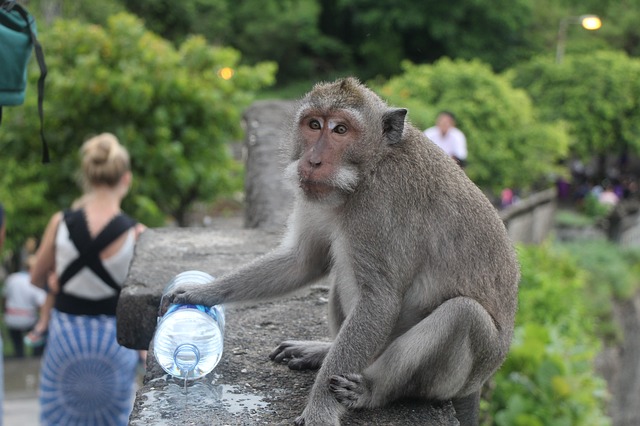Monkeys sure can be naughty creatures—you know this to be true if you’ve ever encountered them, especially the plastic-crazy ones at Ubud’s Monkey Forest that will jump you for your sunglasses, cameras, bottles, and whatever else catches their eye. But the monkeys at Uluwatu Temple are apparently a head above the rest, as they steal tourists’ stuff, then give it back in exchange for food.
The monkeys will swipe whatever valuables they can grab and only return them to tourists after they have been awarded food from temple staff. It’s quite the hustle, just the watch the video taken by researcher Jean Baptiste-Leca in 2015.
This behavior has only been observed at Uluwatu in Bali, says Fany Brotcorne, a primatologist at the University of Liège in Belgium.
“It’s a unique behavior. The Uluwatu Temple is the only place in Bali where it’s found,” she said, as quoted by New Scientist.
Brotocorne, along with Baptiste-Leca and other colleagues, ran a scientific study of the long-tailed macaques at Uluwatu—something which previously had never been scientifically studied in the wild.
Why are the monkeys at Uluwatu the only known ones running this crafty operation? The study concludes that the stealing and bartering behavior is learned, passed down by generations of macaques at the temple. Based on the study, the monkeys who spent the most time around tourists were the ones most commonly robbing and bartering, while groups of macaques that had young males were also more likely to practice the behavior.
While the study was first conducted about four groups of macaques around Ulutwatu back in 2010, Brotocorne has since returned to Bali, studying a fifth group of outsiders, that moved into the area and learned the behavior.
“This indicates that it can indeed be a new behavioral tradition in primates and one that teaches us that new traditions can involve robbing and bartering with a different species,” says Serge Wich, a primatologist at Liverpool John Moores University in the UK.
Though the study sure does help explain some entertaining behavior from our local monkeys, Brotocorne believes her work could mean more for shedding light on monkey’s cognitive abilities or even better our understanding of human evolution.



